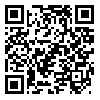Volume 9, Issue 4 (Autumn 2021)
PCP 2021, 9(4): 293-302 |
Back to browse issues page
Download citation:
BibTeX | RIS | EndNote | Medlars | ProCite | Reference Manager | RefWorks
Send citation to:



BibTeX | RIS | EndNote | Medlars | ProCite | Reference Manager | RefWorks
Send citation to:
Aghajani M, Izadi M, Farrokhi N, Hassani F. Investigation of Relationships Between Sensitivity to Reinforcement Traits and Emotion Dysregulation. PCP 2021; 9 (4) :293-302
URL: http://jpcp.uswr.ac.ir/article-1-758-en.html
URL: http://jpcp.uswr.ac.ir/article-1-758-en.html
Investigation of Relationships Between Sensitivity to Reinforcement Traits and Emotion Dysregulation
1- Department of Education & Counseling, Central Tehran Branch, Islamic Azad University, Tehran, Iran.
2- Department of Education and Counseling, Faculty of Psychology and Educational Sciences, Central Tehran Branch, Islamic Azad University, Tehran, Iran. , dr.izadi.mahshid1452@gmail.com
3- Department of Assessment & Measurement, Faculty of Psychology and Educational Sciences, Allameh Tabataba’i University, Tehran, Iran.
4- Department of General Psychology, Faculty of Psychology and Educational Sciences, Central Tehran Branch, Islamic Azad University, Tehran, Iran.
2- Department of Education and Counseling, Faculty of Psychology and Educational Sciences, Central Tehran Branch, Islamic Azad University, Tehran, Iran. , dr.izadi.mahshid1452@gmail.com
3- Department of Assessment & Measurement, Faculty of Psychology and Educational Sciences, Allameh Tabataba’i University, Tehran, Iran.
4- Department of General Psychology, Faculty of Psychology and Educational Sciences, Central Tehran Branch, Islamic Azad University, Tehran, Iran.
Abstract: (2777 Views)
Objective: We investigated the relationship between the Reinforcement Sensitivity Theory (RST) traits and emotion dysregulation signs, including social anxiety, general anxiety, and depression in students.
Methods: A total of 189 students of the public universities in Tehran were selected by convenience sampling and answered the Patient Health Questionnaire-9, Generalized Anxiety Disorder Scale, Social Interaction Anxiety Scale, and Punishment Sensitivity Questionnaire and Reward Sensitivity. Data analysis was done using SPSS v. 26 software by Pearson correlation coefficient and multiple regression analysis.
Results: Pearson correlation coefficient showed a significant relationship between punishment and reward sensitivity and symptoms of emotional dysregulation. Also, multiple regression analysis showed that reward and punishment sensitivity could predict emotion dysregulation.
Conclusion: Punishment hypersensitivity and reward hyposensitivity were higher-order, shared factors for emotion dysregulation signs, including depression, social anxiety, and generalized anxiety. These findings emphasize the effect of behavioral activation as a technique to increase reward pursuit by the individual and suggested that this technique is able to increase reward-seeking and consequently, improve emotional regulation.
Methods: A total of 189 students of the public universities in Tehran were selected by convenience sampling and answered the Patient Health Questionnaire-9, Generalized Anxiety Disorder Scale, Social Interaction Anxiety Scale, and Punishment Sensitivity Questionnaire and Reward Sensitivity. Data analysis was done using SPSS v. 26 software by Pearson correlation coefficient and multiple regression analysis.
Results: Pearson correlation coefficient showed a significant relationship between punishment and reward sensitivity and symptoms of emotional dysregulation. Also, multiple regression analysis showed that reward and punishment sensitivity could predict emotion dysregulation.
Conclusion: Punishment hypersensitivity and reward hyposensitivity were higher-order, shared factors for emotion dysregulation signs, including depression, social anxiety, and generalized anxiety. These findings emphasize the effect of behavioral activation as a technique to increase reward pursuit by the individual and suggested that this technique is able to increase reward-seeking and consequently, improve emotional regulation.
Type of Study: Applicable |
Subject:
Cognitive behavioral
Received: 2021/04/10 | Accepted: 2021/08/23 | Published: 2021/10/1
Received: 2021/04/10 | Accepted: 2021/08/23 | Published: 2021/10/1
| Rights and permissions | |
 |
This work is licensed under a Creative Commons Attribution-NonCommercial 4.0 International License. |








